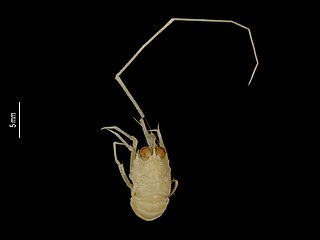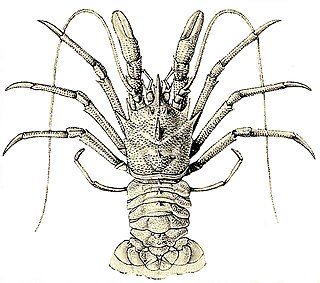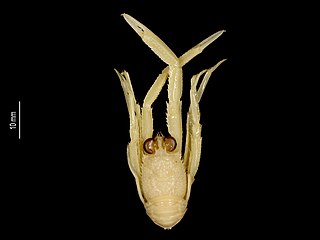
Squat lobsters are dorsoventrally flattened crustaceans with long tails held curled beneath the cephalothorax. They are found in the two superfamilies Galatheoidea and Chirostyloidea, which form part of the decapod infraorder Anomura, alongside groups including the hermit crabs and mole crabs. They are distributed worldwide in the oceans, and occur from near the surface to deep sea hydrothermal vents, with one species occupying caves above sea level. More than 900 species have been described, in around 60 genera. Some species form dense aggregations, either on the sea floor or in the water column, and a small number are commercially fished.

Munidopsis serricornis is a species of squat lobster. It is widely distributed in the world's oceans, being found in the eastern Atlantic Ocean, the western Atlantic Ocean, and the Indo-Pacific. It grows up to a carapace length of 20 millimetres (0.8 in).

Munidopsis is a genus of squat lobster. It is the second largest of all the genera of squat lobsters, after Munida, with over 200 species. Its members are mainly found on continental slopes and on abyssal plains. A few fossil species are also known, including specimens from the Campanian (Cretaceous).
Nanogalathea is a genus of squat lobster from the Bay of Bengal. There are two species in the genus Nanogalathea.

Allogalathea elegans is a species of squat lobster that is sometimes kept in marine aquariums. Despite their common name, they are more closely related to hermit crabs than lobsters.

Alainius crosnieri is a species of squat lobster in the monotypic genus Alainius in the family Galatheidae.
Anomoeomunida is a monotypic squat lobster genus in the family Munididae. The sole a species of is Anomoeomunida caribensis. It occurs in the western Atlantic.

Anoplonida is a genus of squat lobsters, which are flattened dorsoventrally, in the family Munididae, containing the following species:

Crosnierita is a genus of squat lobsters in the family Munididae, containing the following species:
Enriquea leviantennata is a species of squat lobster in the monotypic genus Enriquea in the family Munididae.

Galacantha is a genus of squat lobsters in the family Munidopsidae, containing the following species:

Heteronida is a genus of squat lobsters in the family Munididae. They occur in the western Pacific Ocean.

Lauriea is a genus of squat lobsters in the family Galatheidae, containing the following species:

Leiogalathea is a genus of squat lobsters in the family Munidopsidae, containing the following species:

Neonida grandis is a species of squat lobster in the monotypic genus Neonida in the family Munididae.

Plesionida is a genus of squat lobsters in the family Munididae. As of 2017, it contains the following species:

Raymunida is a genus of squat lobsters in the family Munididae, containing the following 11 species:
Setanida cristata is a species of squat lobster in the monotypic genus Setanida in the family Munididae.

Shinkaia crosnieri is a species of squat lobster in a monotypic genus in the family Munidopsidae. S. crosnieri lives in deep-sea hydrothermal vent ecosystems, living off of the chemosynthetic activity of certain bacteria living on its setae.

Munidopsidae is a family of crustaceans belonging to the order Decapoda. The Munidopsids are the deepest-dwelling family of superfamily Galatheoidea, which comprises families Galatheidae, Munididae, Munidopsidae, and Porcellanidae.













